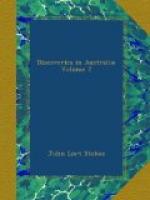I was curious to know how he managed to procure the obedience of this aboriginal victim; and the inhuman wretch confessed, without a blush—which must rise instead to the cheeks of my readers, when they hear of what barbarities their countrymen have been guilty—that he kept the poor creature chained up like a wild beast; and whenever he wanted her to do anything, applied a burning stick, a fire-brand snatched from the hearth, to her skin! This was enough. I could listen to no more, and hurried from the spot, leaving my brutal informant to guess at the cause of my abrupt departure. It is possible that the emotion I allowed to appear may have introduced some glimmering of the truth into his mind, that he may have faintly perceived how disgusted I was with his narrative; but such is the perversion of feeling among a portion of the colonists, that they cannot conceive how anyone can sympathize with the black race as their fellow men. In theory and practice they regard them as wild beasts whom it is lawful to extirpate. There are of course honourable exceptions, although such is a very common sentiment. As an instance, I may mention that a friend of mine, who was once travelling in Tasmania, with two natives of Australia, was asked, by almost everyone, where he had CAUGHT them? This expression will enable the reader better to appreciate the true state of the case than many instances of ferocity I could enumerate. It shows that the natives occupy a wrong position in the minds of the whites; and that a radical defect exists in their original conception of their character, and of the mode in which they ought to be treated.
CAPTURE OF NATIVES.
Soon after I returned to the ship at Port Dalrymple, a party of natives was sent on board, with a request that I would allow the Vansittart to take them to Flinders Island; it consisted of an elderly woman and man, two young men, and a little boy. These were the remainder of the small tribe to which belonged the woman who received, as I have related, such cruel treatment from her keeper. I should here state, that when she was removed to Flinders Island, none of the natives there could understand her—a fact somewhat hostile to the theory of those who hold that there is little or no variety in the aboriginal languages of Australasia.
The party of natives in question were taken by some sealers on the western coast, near Arthur’s River, and not far from the Van Diemen’s Land Agricultural Company’s station at Point Woolnorth, to which place they were first brought. A reward of 50 pounds had been offered for their apprehension, on account of some depredations they were said to have from time to time committed. A countrywoman of their own, the wife of one of the sealers, was instrumental in their capture. Pretence was made that the boat would carry them to some good hunting ground; but when they were all afloat, and prostrated by sea-sickness, the sealers made sail for the Company’s station at Point Woolnorth, with a freight more valuable than seal-skins.




